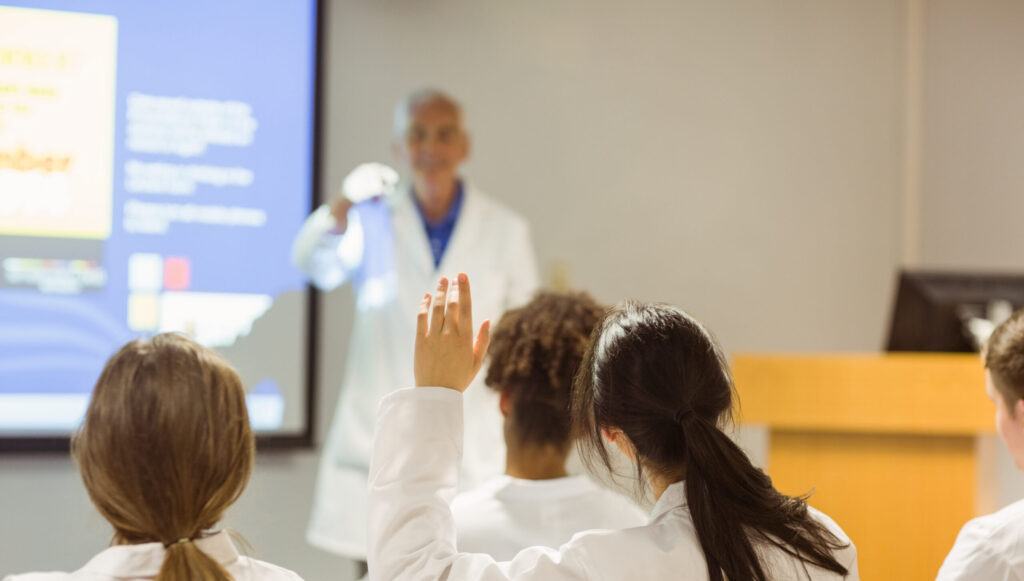Florida is the fastest growing state in the nation, according to new Census Bureau data, with approximately 900 people per day arriving to live here in recent years – which is making an existing shortage of doctors worse.
To combat the shortage, Florida State University College of Medicine operates six regional campuses around the state – including one in Fort Pierce that has already supplied the Vero Beach area with several physicians.
“Florida doesn’t have enough primary care, internal and family physicians to serve the population,” said Dr. Juliette Lomax–Homier, Dean of Fort Pierce regional campus. “There’s also a shortage in our area of gynecologists, obstetricians and geriatricians. That is one reason why FSU College of Medicine, which is based in Tallahassee, has six satellite campuses throughout the state including this one on the main campus of Indian River State College.”
The Florida State University College of Medicine provides third- and fourth-year clinical training at regional medical schools around the state through affiliations with local physicians, ambulatory care facilities and hospitals. At the Fort Pierce regional campus, students are given the opportunity to rotate in family medicine, internal medicine, pediatrics, surgery, obstetrics-gynecology, psychiatry, geriatrics and emergency medicine.
Recently, FSU College of Medicine added physician assistant students who spend one year of clinical time on the campus.
“Right now, we have 37 enrolled,” said Dr. Lomax-Homier. “Seventeen of them are third-year students, nine are doing their rotations and eight are physician assistant students. We have at least 300 local doctors and physician assistants who serve as our faculty to teach our collective groups of students with clerkship directors assigned for each specialty to implement the curriculum of those particular topics for students as they rotate.”
Students attend lectures on campus on Wednesday mornings, but the rest of the week they are doing hands-on clinical training in the field with area doctors. These students are examining patients, watching surgeries, learning how to deliver babies and doing pediatric examinations.
“Our doctors love teaching students, and while we do provide a small stipend, many physicians donate it back to the college for student scholarships,” Dr. Lomax-Homier continued. “We invite doctors in to do lectures within their specialty and they generally do this for free as a service to the medical community. None of us became physicians without the guidance of other physicians before us, so teaching our students is a way of giving back.
“For the most part, patients welcome our students’ participation in their care,” Dr. Lomax-Homier said. “They understand that their physicians are teachers and that teaching physicians need to be most current in their practice because they have students who are learning from them and watching everything they do. Being a teaching physician adds to the level of service because those physicians work really hard to make sure they are up to date on all the newest procedures and technology.
“Until recently, local students had to leave the area to complete their internships and residencies because there were no programs in the area. Now, there are both internal and surgical residency programs at HCA Lawnwood Hospital. HCA St. Lucie Medical Center in Port St. Lucie offers residencies in family and emergency medicine.”
Many of the students at the Fort Pierce campus have ties to South Florida and choose to study there so they can go home on weekends and stay close to family.
“I have students at this campus who call Jupiter, Port St. Lucie, Coral Springs, Miami and Fort Lauderdale home,” said Dr. Lomax-Homier. “I even have one student who grew up in Port St. Lucie and is living at home while pursuing his education. It seems that every year I have one or two students who have grown up in the area and they can come back home and live for two years which helps decrease the overall costs.”
FSU seeks students who are mission-driven to serve the elderly, minority and underserved populations of Florida, which is why their satellite campuses are located in areas that lack the number of physicians needed to serve the community. Studying at the regional campus in Fort Pierce gives students an idea of what it is like to live in the area and the hope is they will return to practice in the community.
“There are two people who have completed residencies and come back to practice in Vero Beach and a few in Martin County,” said Dr. Lomax-Homier proudly. “There’s even a pathologist who works at the local medical examiner’s office.
“We are thrilled that Indian River State College opened up a part of their campus for our college,” Dr. Lomax-Homier added. “This is not an Indian River State College program but we at the FSU College of Medicine are grateful they are our landlords because of its central location and the amenities they provide for us. Our students are well cared for on their campus and proud to be part of the community.”
Dr. Juliette Lomax-Homier received her medical degree from Boston University School of Medicine and completed her residency in Obstetrics and Gynecology at the Boston City Hospital. She relocated to Fort Pierce after residency to fulfill a commitment to the Health Service Corps, where she worked as a staff obstetrician and gynecologist at a Federally Qualified Health Center in Fort Pierce. She became dean of the Ft. Pierce regional campus in 2015. For more information about the campus visit med.fsu.edu/ftpierce.

